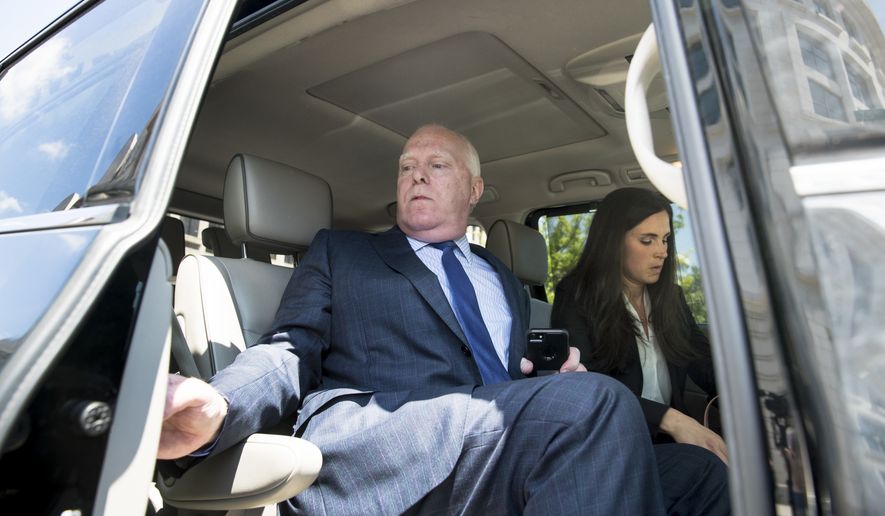The Russian consulting firm accused of bankrolling social media meddling in the 2016 presidential election spent less than $5,000 on candidate ads and rallies that would be subject to government auditing, the company argues in a court filing.
The motion from Concord Management and Consulting LLC challenges the federal government’s assertion that it spent huge sums of Russian money on social media aimed at disrupting the American political process.
Concord is charged with failing to file with the Federal Election Commission. The firm says some of the online ads listed in an indictment brought by special counsel Robert Mueller cost less than $10 each and added up to $2,930. Conjured-up rallies cost another $1,833 in payroll.
The 2018 indictment accuses Concord of funding the Internet Research Agency. That is the Russian troll farm in St. Petersburg that bought the internet ads, did social media spoofing and set up rallies against candidate Hillary Clinton and for Donald Trump.
“The allegation in the Indictment claiming that IRA spent thousands of dollars each month to purchase advertisements is at best misleading and at worst demonstrably false because the discovery indicates that many of the advertisements took place after the 2016 presidential election or did not involve any clearly identifiable candidate,” Concord attorney Eric A. Dubelier argued in a Monday filing in U.S. District Court.
In its filing, Concord cited cost figures based on evidence from U.S. prosecutors. The indictment listed ads that were required to be reported in campaign finance reports to the FEC.
DOCUMENT: Concord court filing
The filing’s main argument has to do with the identities of defendants. It claims the government refuses to say which company employees violated FEC laws. Only one Concord employee is listed: its head, Yevgeny Prigozhin, a food service mogul close to Russian President Vladimir Putin.
“This means that the responsible conspirator would have had to know that of the millions of rubles equating to hundreds of thousands of dollars of Concord’s money allegedly spent by IRA, at worst approximately $2,900 were spent for advertisements and $1,800 were spent for rallies that the FEC could possibly conclude were independent expenditures for express advocacy,” Mr. Dubelier said in a 24-page motion.
Mr. Dubelier took from the indictment the cited internet ads that could be subject to an FEC filing requirement. Two ads in early April 2016 cost about $60. Three online ads in May totaled about $230. An ad in August cost $7.58.
The indictment said the Internet Research Agency purchased ads on Facebook and Instagram to promote rallies. The cost, says Mr. Dubelier: $1,677.
The Mueller indictment states that Concord and Mr. Prigozhin launched Project Lakhta to fund political interference and information warfare at home and abroad.
It says Concord’s budget for Internet Research Agency operations exceeded $1.25 million a month to interfere in “various countries, including the United States.”
The indictment doesn’t break down the amount dedicated to the U.S. or to other countries, and it does not say how many countries were targeted.
The indictment charges Concord with defrauding the U.S. by not filing with the FEC. It also failed to file with the Justice Department under the Foreign Agents Registration Act.
Mr. Dubelier said Concord has no presence in the U.S. to act as a foreign agent.
He asked the judge to order the prosecution to identify who specifically failed to register.
“If the Court does not require the government to identify which defendant(s) were required to register under FARA (and on behalf of whom) or file under FECA it will be impossible for Concord to prepare for trial; and moreover, the Court will not know until sometime during trial whether or not the indictment should be dismissed as a matter of law,” Mr. Dubelier argued.
A trial may be scheduled for spring.
The indictment portrays the Internet Research Agency and Concord as a team executing an insidious campaign to disrupt the U.S. presidential election.
“Defendant organization had a strategic goal to sow discord in the U.S. political system, including the 2016 U.S. presidential election,” the indictment says. “Defendants posted derogatory information about a number of candidates, and by early to mid-2016, Defendants’ operations included supporting the presidential campaign of then-candidate Donald J. Trump and disparaging Hillary Clinton.”
• Rowan Scarborough can be reached at rscarborough@washingtontimes.com.




Please read our comment policy before commenting.